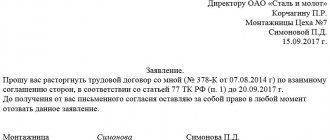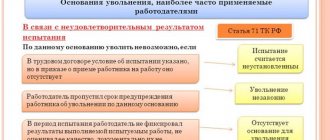| Issues of terminating an employment contract with a part-time worker usually do not cause controversy if the employment relationship is terminated on general grounds. But if a part-time worker is fired due to the hiring of an employee for whom this work will become the main one (Article 288 of the Labor Code of the Russian Federation), the emergence of a labor dispute is almost inevitable. In the article, using examples of court decisions, we will show what violations are committed by employers when dismissing a part-time worker on this basis. | Related articles: —Civil contract or employment contract—Illegally dismissed employee—Fixed-term employment contract —Individual labor dispute |
Dismissal of a part-time worker.
Termination of an employment contract with a part-time worker in the event of hiring an employee.
The dismissal of a part-time worker in the event of hiring an employee for whom this work will be the main one occurs as follows: the employer warns the dismissed person in writing at least two weeks before the termination of the employment contract.
Let us consider the court decision from a generalization of the practice of considering civil cases arising from labor relations for 2009 of the Kaa-Khemsky District Court of the Republic of Tyva.
K. filed a lawsuit against MDOU “Kindergarten No. 5 “Rodnichok” for reinstatement at work, recovery of wages for the period of forced absence and compensation for moral damage, indicating that since 09/01/2008 she worked as a part-time music director in the kindergarten. By order of September 1, 2009, she was dismissed as a temporary employee; she considers the dismissal illegal.
When considering the case, the court found that the plaintiff, having a permanent job as a teacher at the Children's Art School, was hired part-time at the Rodnichok kindergarten as a music director at 0.5 rates, allocated from the rate of the main employee B., at indefinite term.
Later, B. approached the head of the kindergarten with a request to grant her again 0.5 times the salary of a music director, since she has two minor children and is a widow. In connection with the satisfaction of her request, K. was dismissed as a temporary employee.
In accordance with Art. 288 of the Labor Code of the Russian Federation, in addition to the grounds provided for by the Labor Code of the Russian Federation and other federal laws, an employment contract concluded for an indefinite period with a person working part-time may be terminated in the event of hiring an employee for whom this work will be the main one, about which the employer in writing form warns the specified person at least two weeks before termination of the employment contract.
Since the main employee was already working, but a part-time worker was hired at his 0.5 rate for an indefinite period, the employer was still obliged to warn him at least two weeks before terminating the employment contract.
The court found that K. was not notified in writing about the upcoming dismissal. Under such circumstances, the dismissal was illegal, since the employer violated the procedure provided for in Art. 288 Labor Code of the Russian Federation. By a court decision, plaintiff K. was reinstated at work, wages for the period of forced absence and compensation for moral damage in the amount of 2,000 rubles were collected from the defendant.
The procedure for dismissing a part-time worker
A part-time employee is definitely the same employee as the main employee, and therefore the procedure for his dismissal should be absolutely the same.
There are three options for terminating an employment relationship with an employee:
- based on your own desire;
- thanks to the agreement of the parties;
- based on the initiative of the employer.
If a person who combines several jobs quits based on his own desire, then the first thing he needs to do is write a letter of resignation. Based on it, the manager prepares an order for the company. At the same time, the resigning employee must work the required two weeks before leaving.
In the second situation, termination of an employment contract by a part-time worker is carried out as follows:
- he writes a letter of resignation from combining several official duties at the same time and, together with the employer, signs an agreement;
- the manager issues an order to the institution to dismiss such an employee;
- If necessary, a note is made in the work book.
Dismissal of a part-time worker under Art. 288 of the Labor Code of the Russian Federation is dismissal at the initiative of the employer.
The Arkhangelsk Regional Court considered case No. 44-G-385 on Sh.’s complaint against earlier court decisions to reinstate her at work.
Sh. worked as a urologist in a hospital (hereinafter referred to as the MUZ) part-time at 0.5 times the salary. Subsequently, she was fired due to the hiring of another employee, for whom this work was the main one (Article 288 of the Labor Code of the Russian Federation).
Not agreeing with the part-time dismissal, Sh. filed a claim with the Oktyabrsky District Court of Arkhangelsk for reinstatement at work, changing the wording of the legal regime of the work performed, recovery of maternity benefits, and recovery of monetary compensation for moral damages. In support of the claims, she indicated that the defendant incorrectly defined the type of employment contract concluded with her as part-time work, since the work of a urologist was her only and permanent place of work. Moreover, the defendant could not fire her on his own initiative, since on the date of her part-time dismissal she had a disabled child under the age of three and was pregnant. By the decision of the Oktyabrsky District Court, Sh.’s claims were denied. The cassation court left this decision unchanged.
The regional court, having checked the case materials, noted that the courts, making a decision not in favor of the plaintiff, rejected her argument that working for the defendant was the main (only) place of work, and considered Sh.’s work as a urologist to be a part-time job. To substantiate this conclusion, the courts referred to the application and order for part-time employment. However, their opinion is wrong. And that's why.
In themselves, the application and order for part-time employment are not indisputable evidence of the plaintiff’s part-time work. When deciding on the terms of the employment contract, one should proceed from the compliance of the order with the requirements of the current legislation and the actual conditions of the employment contract.
According to Art. 282 of the Labor Code of the Russian Federation, part-time work is the performance by an employee of other regular paid work under the terms of an employment contract in his free time from his main job. From the content of this provision of the law it follows that work under an employment contract is part-time if:
- the employment contract was concluded with an employee who is already in an employment relationship with the same or another employer;
- under this contract, other work is performed in addition to the main one;
- The work performed under another employment contract is regular and paid.
Thus, part-time work requires the employee to have another (main) permanent and paid place of work.
From the case materials it follows that neither on the date of concluding the employment contract with the defendant, nor on the day of dismissal, Sh. had another permanent place of work.
Since the conclusion of an employment contract on a part-time basis reduces the level of rights and guarantees of the employee, in particular, it allows him to be fired in connection with the hiring of another person, the court had to assess the legality of the condition in the employment contract concluded with the plaintiff on part-time work.
The Arkhangelsk Regional Court indicated that the resolution of the dispute regarding the dismissal procedure also depends on the conclusions regarding the legality of Sh.’s work on a part-time basis. Moreover, the regional court declared the previous decisions unlawful in terms of the Ministry of Health's compliance with the dismissal procedure for Sh., since she has a disabled child under the age of three and was pregnant at the date of dismissal.
The courts of the first and second instances came to the conclusion that dismissal under Art. 288 of the Labor Code of the Russian Federation does not constitute dismissal at the initiative of the administration, and therefore the guarantees established by law regarding the prohibition of dismissal at the initiative of the employer of pregnant women and women with children under three years of age do not apply to Sh.
However, the guarantees established by the Labor Code of the Russian Federation for pregnant women and women with children under three years of age apply to any grounds for dismissal if it occurs on the initiative of the administration. When making decisions, the courts should have taken into account that upon dismissal under Art. 288 of the Labor Code of the Russian Federation unilaterally expresses the will of the employer to replace a part-time worker with another employee for whom this place of work will be the main one. The initiative or consent of the part-time employee for dismissal was not required.
The legislator in the Labor Code established certain benefits for women upon dismissal, regardless of whether they work at their main place of work or part-time (Article 261 of the Labor Code of the Russian Federation). Therefore, termination of an employment contract at the initiative of the employer with pregnant women, as well as women with children under three years of age, single mothers raising a disabled child under 18 years of age, is not allowed, except in cases of liquidation of the organization.
Based on the norms of the Labor Code of the Russian Federation, the regional court overturned the previous court decisions and reinstated Sh. at work.
Registration of dismissal of a part-time worker
The procedure for terminating an employment contract differs slightly from the general one in that the work book is kept at another enterprise in which he is listed as the main employee. Therefore, a completely reasonable question arises as to who should fill out the work book when a part-time worker is dismissed.
Registration takes place at the main place of work, taking into account the fact that the employee in whose employment record is made must bring a document that confirms the dismissal, indicating the reason and justification for the termination of the employment contract. It turns out that the dismissed person needs to bring a copy of the order or a certificate from the enterprise, which will contain the wording and a reference to the norm of the Labor Code of the Russian Federation regulating the basis for terminating the contract with the employee.
The company where the part-time worker worked was entrusted with the obligation to correctly complete the basic documents, make all the necessary payments on time, pay them in a timely manner and issue the requested certificates. The dismissed employee receives compensation for unused vacation along with his salary, regardless of the reason for leaving his position. But in case of staff reduction or liquidation, he must also receive severance pay in the amount of no less than the minimum established by law
ipinform.ru
Dismissal of a part-time employee during vacation or illness.
Dismissal of a part-time worker during vacation or a period of temporary disability at the initiative of the employer, including under Art. 288 of the Labor Code of the Russian Federation, illegal.
On 04/08/2010, the Sovetsky District Court of the city of Tomsk considered the case regarding G.’s claim against the LLC for reinstatement at work, recovery of wages, vacation pay, average earnings for the period of forced absence, and compensation for moral damage.
G. filed a lawsuit against the LLC for reinstatement at work and, in support of her claims, indicated that she was hired by the defendant to work part-time for an indefinite period. On 02/08/2010, she received a letter from the defendant at her home address stating that on 02/14/2010 she would be dismissed in connection with the hiring of an employee on a permanent basis for her position. At the time of receiving the letter, she was on vacation (from 02/08/2010 to 02/20/2010) and was undergoing treatment. On February 27, 2010, she received another letter stating that her employment relationship had been terminated.
At the court hearing, the defendant’s representative did not admit the claim and explained that on 02/03/2010 a notice of dismissal from his position was sent to the plaintiff. The dismissal order was issued on February 17, 2010; G. refused to familiarize herself with it.
After listening to the explanations of the parties, examining and evaluating the evidence presented, the court considered that the claim should be partially satisfied on the following grounds.
According to the employment contract, G. was hired by the LLC on a part-time basis for the period from 11/01/2006 to 01/31/2010. From G.’s testimony it is clear that she actually began performing the work, but the employment contract was signed only on 01/01/2007 and for an indefinite period. The defendant's representative admitted this fact.
In this regard, when deciding on the dismissal of the plaintiff, the employer was obliged to take into account the provisions of Art. 288 Labor Code of the Russian Federation.
Paragraph 23 of the Resolution of the Plenum of the Armed Forces of the Russian Federation dated March 17, 2004 No. 2 “On the application by the courts of the Russian Federation of the Labor Code of the Russian Federation” establishes that when considering a case on the reinstatement of a person whose employment contract was terminated at the initiative of the employer, the obligation to prove the existence of a legal basis dismissals and compliance with the dismissal procedure are the responsibility of the employer.
As follows from the order, from 02/01/2010, V. was hired on a permanent basis to work in the LLC for the position held by part-time worker G.. A record of hiring is available in V.’s work book. The fact of his employment was confirmed by witnesses. Taking into account the above, the court considers that V.’s employment with the LLC on a permanent basis from 02/01/2010 was confirmed. This means that the employer had a legal basis for dismissing the plaintiff. At the same time, the procedure for dismissing a part-time worker was not followed, which is confirmed by a number of circumstances.
The employee must be notified in writing of the date of the upcoming dismissal of the part-time employee, which cannot occur earlier than two weeks after the notification. The notice dated 02/03/2010 addressed to G. indicated that the employment contract with her would be terminated on 02/14/2010. When dismissing the plaintiff on 02/17/2010, the employer was obliged to warn him in writing about the upcoming dismissal no later than 02/03/2010. Thus, initially the notification of the upcoming dismissal did not comply with the requirements of the law, and therefore cannot be recognized as proper as containing false information about the date of dismissal of the part-time worker.
In addition, according to the provisions of Art. 81 of the Labor Code of the Russian Federation, it is not allowed to dismiss an employee at the initiative of the employer (except in the case of liquidation of an organization or termination of activities by an individual entrepreneur) during the period of his temporary disability and while on vacation. Dismissal of a part-time worker under Art. 288 of the Labor Code of the Russian Federation is dismissal at the initiative of the employer. By terminating the employment relationship on the 17th, that is, before the end of the vacation on February 20, the LLC significantly violated the norms of labor legislation and the procedure for dismissal. Under such circumstances, even if there are grounds for dismissing the plaintiff, the court cannot recognize the dismissal as legal. G. was reinstated to her previous job at the LLC as of February 17, 2010.
Grounds for dismissal of a part-time worker
An employee working part-time can be fired:
- On general grounds (Article 77 of the Labor Code of the Russian Federation).
These include dismissal at the initiative of the employee and the employer, by agreement between them and due to circumstances beyond the control of the parties.
- On an additional basis (Article 288 of the Labor Code of the Russian Federation).
Such a basis is the dismissal of an employee for whom this work will be the main one when hiring a part-time position.
When hiring an employee for a part-time position, it doesn’t matter if it is formalized:
- under a fixed-term or open-ended employment contract;
- for full or short-time work.
The procedure for dismissing an external part-time worker at the initiative of the employer
The dismissal of an external part-time worker is no different from the dismissal of employees working in the main position, since the termination of the employment contract in this case occurs only on the basis of the provisions of the Labor Code.
Except for cases where termination of an employment contract occurs on the grounds provided for in Chapter 13 of the Labor Code, the grounds should also include the hiring of an employee for this position for whom the specific work will be the main one.
If this is the reason for dismissing a part-time worker, the employer must be guided by Article 288 of the Labor Code of the Russian Federation in carrying out the dismissal procedure.
The main requirement that this regulatory act makes for the employer is the need to mandatory notify the part-time employee of his dismissal at least two weeks before signing the order. The notification must be given to the part-time worker in writing against signature.
Otherwise, the dismissal procedure is no different from the dismissal of an employee working in the main position:
- after giving the employee a written notice, the employer is given at least two weeks to prepare all the necessary documents, including those that will reflect the work of the part-time worker from his professional point of view and will be able to confirm his work experience;
- during the time established as necessary for notice of dismissal and subsequent work as a part-time worker, the employer is obliged to make all necessary payments to the employee;
- the employee, in turn, must completely transfer all matters to the person accepted as the main employee.
The order to dismiss a part-time worker is signed on the day indicated as the last day of work of the part-time worker in the notice handed to him.
If the deadline for delivering notice of dismissal is violated or the order is not signed in accordance with established regulatory requirements, then the dismissed employee has the right to demand that his position and workplace be retained until all necessary deadlines have been met.






